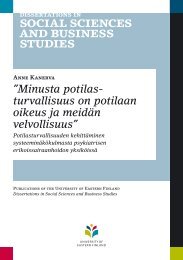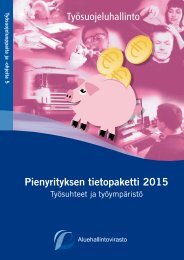urn_isbn_978-952-61-1770-6
urn_isbn_978-952-61-1770-6
urn_isbn_978-952-61-1770-6
- No tags were found...
You also want an ePaper? Increase the reach of your titles
YUMPU automatically turns print PDFs into web optimized ePapers that Google loves.
article). This summarisation was carried out by applying the methods of rationalargumentation theory, which provides a means of gaining deeper insight into thesubstantive reasons given by the ECtHR. 47The ‘comparative argumentation’ article was based on argument analysiswhere comparative arguments were categorised by reference to their nature andfunction in the judgment. Case law involving comparative argumentation from2002, 2007 and 2012 was analysed. These years were chosen to demonstrate potentialchange in the ECtHR’s reasoning as regards the emerging use of comparativearguments. 48 The search term ‘comparative’ was used, and a total of 67judgments were analysed. 49 Comparative reasoning was only used in four casesin 2002, as compared to 18 in 2007 and 45 in 2012. These cases were analysed fromthe comparative argumentation point of view in respect of the ECtHR. 50In the ‘social rights’ article, arguments concerning social rights were categorisedunder the Convention provisions and their justifiability was closely analysed.The emphasis was on how the ECtHR justifies its extension of Conventionprovisions to the field of social rights by reference to 87 judgments searchedthrough the HUDOC database. The arguments used in these cases with regard tosocial rights and their justifiability were analysed carefully. The ECtHR’s reasoningwas carefully analysed, looking at how broadly social rights are taken intoconsideration and the sources or arguments relied upon by the ECtHR to justifyits extensive interpretations. The question of what search terms should be usedto find relevant cases was a difficult methodological issue. Since the interpretationof positive obligations has been the ECtHR’s main method of extendingthe scope of Convention provisions, using the search term ‘obligations’ seemeda well-justified methodological choice. 51 In addition, ‘social rights’ or ‘economic47Paso 2014, at 240; Aarnio 1987. See also McKee 2003; on discursive analytic research, see Hepb<strong>urn</strong>– Potter 2007; Wodak 2007.48The first year (2002) was chosen to demonstrate the emerging trend of the ECtHR using comparativelaw in its reasoning (for the beginning of the use of comparative law before the courts, see e.g. Glenn2007, at 97; Glenn 2004, at 218–219). The five-year period is seen as an appropriate period to illustrateprogress in the recognition of the use of comparative reasoning within the Convention system: in2007 such use increased (18 judgments). The final year (2012) demonstrates the progress of relativelyestablished use of comparative reasoning by the ECtHR (45 judgments). Other years (e.g. 2001, 2006,2011 etc.) could have been chosen, but this choice is not decisive in this study. The research questionconcerns how comparative reasoning is used by the ECtHR. In order to properly answer this question,it is necessary first to define the case law data to be analysed and then address the question byreference to it.49In total, there were 23 irrelevant cases where the word ‘comparative’ had another meaning. Therelevant cases consist of the following: four judgments in 2002, 18 judgments in 2007 and 45 judgmentsin 2012. Two cases conducted only in French had to be left out of the study for linguistic reasons. Thesewere as follows: Affaire Flamenbaum et autres c. France (2012); Affaire Önal c. Turquie (2012).50Inevitably, the term ‘comparative’ used in the case search might have led to some relevant casesbeing left out and other irrelevant cases being included. This problem, however, inevitably dogs allempirical research: one can never be sure that the search covers all possible relevant cases. For 2012,there were 11 irrelevant cases out of 56 cases; for 2007 there were 8 out of 26; and for 2002 there were4 out of 8. In all of these cases, the word ‘comparative’ was used in a context other than as part of theECtHR’s reasoning. However, the search term ‘comparative’ can be seen as appropriate and justified,because it crystallises what is really looked at in the judgments.51The ECtHR frequently uses obligations arguments (not only including positive obligations, but alsoobligations more generally) when determining whether to extend interpretations, see e.g. Shany 2011,at 79.21




